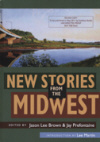New Stories from the Midwest
Lee Martin’s introduction in New Stories from the Midwest promotes Midwest writers, sometimes overlooked by East Coast literati; however, this collection of nineteen writers illustrates less a sense of the Midwest than daring developments of plot and character, which illustrate contemporary realities.
Lee Martin’s introduction in New Stories from the Midwest promotes Midwest writers, sometimes overlooked by East Coast literati; however, this collection of nineteen writers illustrates less a sense of the Midwest than daring developments of plot and character, which illustrate contemporary realities.
Two stories that have clear Midwest settings are Micah Riecker’s “The Drowned Girl,” set on a quiet lake near Petoskey, MI, and Chris Leslie-Hynan’s “Pure Superior,” set in the Upper Peninsula, Michigan and in Sault St. Marie, where the worry is “Our dignity about coming from a Boring Place is very sensitive.” Of course, other stories make brief Midwest references, like Beth Mayer’s “The Way to Mercy” referring to Mercy Hospital, Chicago and also to a favorite Midwestern fish, the smelt.
Mostly the masterly writing stands out. As Martin says, the stories have to do with “the human desire for connection.” However, these are contemporary stories—fortunately, except for one (“Bedtime Stories for the Middle-Aged” by Christie Hodgen), not experimental in form but rather in defying the expectations of the traditional plot. For instance, the usual love story gets transformed. Gregory Blake Smith’s “Being and Nothingness (Not a Real Title)” is the kind of indirect love story written today where a man sharing his apartment with a woman falls for her, even though she is into a million disguises and performances, so that at the end he has to confess his love openly: “The Boyfriend has art and spectra of a thousand digital boyfriends reinforcing him. I have only my bruised and lonely heart, have only the real world, with Venus missing.”
Micah Riecker’s “The Drowned Girl” unfolds like a regular love story except the title reminds us of a reality that at the end must be faced. Chris Leslie-Hynan’s “Pure Superior” is about the strong friendship/quasi-lesbian love between a Russian girl and a girl in a wheelchair (from polio), which becomes desperate at the end, and is so different from other so-called friendships: “Friends are awfully inconsiderate. They leave you where you lie, just anywhere. They go off after their own fun. Friends are pitiless.”
One of the most daring love stories, Benjamin Percy’s “The Tree” is moving, even from the extraordinary point of view of the tree, first growing, and then being loved by a little girl and when the girl goes away, doing anything to get her back home. As Lee Martin says, the sense of loss is a Midwestern theme, here again unexpectedly developed.
In Janice Deal’s “Dinosaurs,” it’s not just the loss of the husband but as the mother-in-law suggests, the future loss of the daughter as she grows up. In Judith Cooper’s “Sister Light-of-Love Dove,” it’s a loss fulfilled in death. The loss of a wife is so strongly felt in Rosellen Brown’s “The Threshold” that up to the last sentence it seems unlikely that a second marriage will survive. Another story of loss defies expectations, with a realistic portrait of an unlovable mother. Carol K. Howell’s “Blood and Milk” has this unlovable mother in a dying coma with her unforgiving daughter talking to her mother’s best friend:
“Mother’s Day. It takes forever to find a card that doesn’t lie. They’re all full of this You-were-always-there for me/What-is-a-mother?/Now-you-are-my-friend bullshit. I have to search hard for one that says something neutral like Enjoy your day…I hate the media, our whole culture, all our institutions presume that everyone had this wonder Ur-mother. There are nauseating little poems in the paper, magazines do mother/daughter stories…Call talk shows share the best advice their mothers gave them. Dear Abby runs her treacly annual tribute…Not everyone had a mother who loved them.”
Just about all the writers deal with the effects of loss: Abby Geni, Bonnie Jo Campbell, Bryan Furuness, James Magruder, and Richard Burgin even to the point of dangerous desperation in his “Do You Like This Room?” And the most experimental in form is Christie Hodgen’s “Bedtime Stories for the Middle-Aged” which parallels stories, some with the same characters, to indicate how common the problems are.
Another unusual but contemporary subject appears in Hubert Ahn’s “Korean Wedding.” The main character has never gotten anything below an A+ in school and knows every kind of music but is a “loser” because he is unable to move either to “get the girl” or decide his future.
Finally the best story in the collection is “Rubber Boy” by David Allan Cates. The structure is so good that only at the end does the reader realize what the story is all about. Every event repeats how the main character comes back with difficulty from a crisis.
But this whole collection is outstanding and showcases some of the talent coming from the Midwest.





